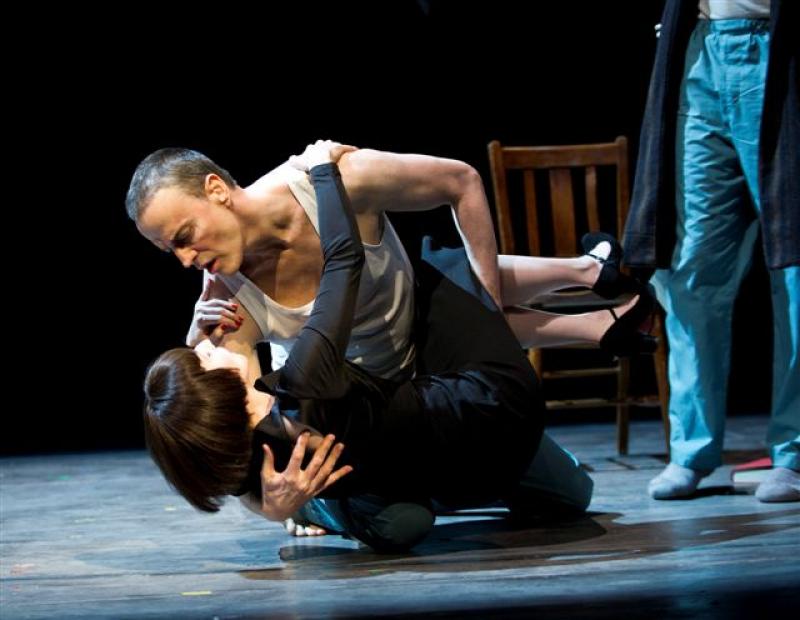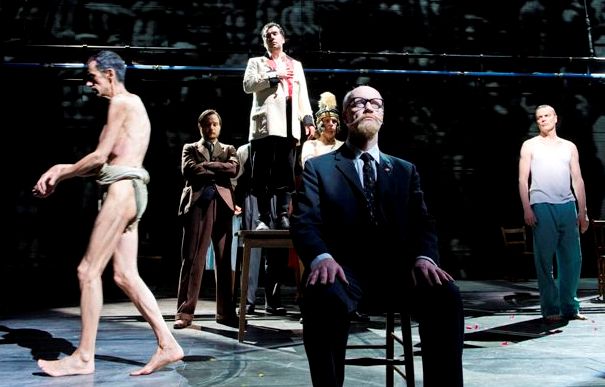The Master and Margarita, Barbican Theatre | reviews, news & interviews
The Master and Margarita, Barbican Theatre
The Master and Margarita, Barbican Theatre
A clever adaptation that's visually dazzling but emotionally unengaging

The Master and Margarita is a rare beast. Not only is it considered to be one of the greatest novels of the 20th century, it also regularly tops reader-lists of all-time favourite books. So it’s no wonder that, since its publication in 1966, 26 years after the author’s early death, Mikhail Bulgakov’s Soviet-era masterpiece has attracted a steady stream of film-makers and theatre directors.
But if anyone can harness the novel’s seductive strangeness and dizzying energy – whilst also, of course, forging a cohesive visual narrative – one feels that it might just be Complicite. Headed by Simon McBurney, better known in non-theatre circles as Robert in Rev and as Kreacher in Harry Potter, its ensemble productions regularly deliver on visual spectacle whilst faithfully elucidating the more cerebral thematic concerns of the works on which they're based. It’s a fine balance to play, and under McBurney’s direction this production manages largely, though certainly not wholly, to pull it off.
The passionate love-story of the title characters develops from a beautifully choreographed first encounter
The three separate strands of the book are rather ingeniously interwoven, and we shift with impressive ease between them. We first find ourselves in 1930s Moscow (Patriarch’s Ponds is a bit like Russell Square, we are told) thence swiftly to first-century Jerusalem and the trial of Jesus (Yeshua, played by Cesar Sarachu) presided over by a troubled, migraine-riddled Pontius Pilate (Tim McMullan). The passionate love-story of the title characters develops from a beautifully choreographed first encounter on the streets of Moscow: Paul Rhys’s later shuffling, stammering, quietly tortured Master and Sinéad Matthews’s assured Margarita weave their bodies through a crowded tram and lose each other in the hectic pace of the city, prefacing their later separation.
 Rhys doubles up as devil-in-disguise Woland, played in dark glasses and with a goofy set of teeth (in an already highly complex scenario what an earth should we make of this intriguing "alter-ego" doubling?). The accent and the overbite might just occasionally make you think of a slightly more sinister, albeit rather more controlled, Mad Professor à la Jerry Lewis. In fact, Woland provides much of the comedy that is otherwise lacking in this adaptation, which, though borrowing heavily from vaudeville (even before Woland's "variety show" there’s a mike-stand stage right where Clive Mendus’s Berlioz and Richard Katz’s Bezdomny perform a little routine) remains rather sober.
Rhys doubles up as devil-in-disguise Woland, played in dark glasses and with a goofy set of teeth (in an already highly complex scenario what an earth should we make of this intriguing "alter-ego" doubling?). The accent and the overbite might just occasionally make you think of a slightly more sinister, albeit rather more controlled, Mad Professor à la Jerry Lewis. In fact, Woland provides much of the comedy that is otherwise lacking in this adaptation, which, though borrowing heavily from vaudeville (even before Woland's "variety show" there’s a mike-stand stage right where Clive Mendus’s Berlioz and Richard Katz’s Bezdomny perform a little routine) remains rather sober.
Behemoth the “hog-sized” cat will almost certainly divide lovers of the book. Here he is a mangy puppet with glowing red eyes, manipulated and voiced by members of the company and depicted as a coarse, over-sexed cockney bruiser. He certainly stands out as part of Woland’s retinue, as both Koroviev (Angus Wright) and Azazello (Ajay Naidu) seem a little underplayed and undifferentiated.
Meanwhile, the set, by Es Devlin, is cavernously dark and spartan - a hospital bed in one corner, a vertical Portakabin in the other. The Portakabin serves as the tram that beheads Berlioz in a perfect bit of stagecraft that involves the splitting of a watermelon – as we might expect from Complicite, the stagecraft throughout is impressive. The most memorable bit of theatre magic, however, comes near the end where the Master and Margarita make off on a horse. Positioned on the floor, their images are projected onto the floor-to-ceiling backdrop, as if astride a galloping horse made up of chairs projected to form a huge equine apparition that coalesces into shape as the company play their part as chair-puppeteers. And when Margarita flies over Moscow, where she again remains largely motionless while black-and-white film footage of the city whizzes past and she is projected onto it. Finn Ross must be applauded for his deft video work where, also under his direction, a wintery Moscow becomes a heat-drenched Jerusalem in the blink of an eye, as swiftly as the soundscape changes, moving from Shostakovich to Grieg, from Tom Waits to the Rolling Stones.
The most memorable bit of theatre magic, however, comes near the end where the Master and Margarita make off on a horse. Positioned on the floor, their images are projected onto the floor-to-ceiling backdrop, as if astride a galloping horse made up of chairs projected to form a huge equine apparition that coalesces into shape as the company play their part as chair-puppeteers. And when Margarita flies over Moscow, where she again remains largely motionless while black-and-white film footage of the city whizzes past and she is projected onto it. Finn Ross must be applauded for his deft video work where, also under his direction, a wintery Moscow becomes a heat-drenched Jerusalem in the blink of an eye, as swiftly as the soundscape changes, moving from Shostakovich to Grieg, from Tom Waits to the Rolling Stones.
There is little sense of tonal shifts and variations in texture
One is left impressed by such dazzling visual trickery, the signature of any Complicite production, as well as the masterful handling of dense layers of allusive (and elusive) narrative. What one might lose in any such adaptation, one perhaps gains here by making the political satire more immediately obvious – one cannot miss the huge projection of Stalin.
Even so, it’s difficult to feel wholly engaged by this production. It’s fast-paced, for sure, and the play’s 195 minutes go by pretty swiftly. But though the backdrop scenery changes at a pace, there is little sense of tonal shifts and variations in texture. What’s more, the lack of emotional investment (how much, in the end, do we really care whether the Master and Margarita are reunited?) makes for a dénouement that’s just a little flat.
rating
Share this article
The future of Arts Journalism
You can stop theartsdesk.com closing!
We urgently need financing to survive. Our fundraising drive has thus far raised £49,000 but we need to reach £100,000 or we will be forced to close. Please contribute here: https://gofund.me/c3f6033d
And if you can forward this information to anyone who might assist, we’d be grateful.

Subscribe to theartsdesk.com
Thank you for continuing to read our work on theartsdesk.com. For unlimited access to every article in its entirety, including our archive of more than 15,000 pieces, we're asking for £5 per month or £40 per year. We feel it's a very good deal, and hope you do too.
To take a subscription now simply click here.
And if you're looking for that extra gift for a friend or family member, why not treat them to a theartsdesk.com gift subscription?
more Theatre
 Troilus and Cressida, Globe Theatre review - a 'problem play' with added problems
Raucous and carnivalesque, but also ugly and incomprehensible
Troilus and Cressida, Globe Theatre review - a 'problem play' with added problems
Raucous and carnivalesque, but also ugly and incomprehensible
 Clarkston, Trafalgar Theatre review - two lads on a road to nowhere
Netflix star, Joe Locke, is the selling point of a production that needs one
Clarkston, Trafalgar Theatre review - two lads on a road to nowhere
Netflix star, Joe Locke, is the selling point of a production that needs one
 Ghost Stories, Peacock Theatre review - spirited staging but short on scares
Impressive spectacle saves an ageing show in an unsuitable venue
Ghost Stories, Peacock Theatre review - spirited staging but short on scares
Impressive spectacle saves an ageing show in an unsuitable venue
 Hamlet, National Theatre review - turning tragedy to comedy is no joke
Hiran Abeyeskera’s childlike prince falls flat in a mixed production
Hamlet, National Theatre review - turning tragedy to comedy is no joke
Hiran Abeyeskera’s childlike prince falls flat in a mixed production
 Rohtko, Barbican review - postmodern meditation on fake and authentic art is less than the sum of its parts
Łukasz Twarkowski's production dazzles without illuminating
Rohtko, Barbican review - postmodern meditation on fake and authentic art is less than the sum of its parts
Łukasz Twarkowski's production dazzles without illuminating
 Lee, Park Theatre review - Lee Krasner looks back on her life as an artist
Informative and interesting, the play's format limits its potential
Lee, Park Theatre review - Lee Krasner looks back on her life as an artist
Informative and interesting, the play's format limits its potential
 Measure for Measure, RSC, Stratford review - 'problem play' has no problem with relevance
Shakespeare, in this adaptation, is at his most perceptive
Measure for Measure, RSC, Stratford review - 'problem play' has no problem with relevance
Shakespeare, in this adaptation, is at his most perceptive
 The Importance of Being Earnest, Noël Coward Theatre review - dazzling and delightful queer fest
West End transfer of National Theatre hit stars Stephen Fry and Olly Alexander
The Importance of Being Earnest, Noël Coward Theatre review - dazzling and delightful queer fest
West End transfer of National Theatre hit stars Stephen Fry and Olly Alexander
 Get Down Tonight, Charing Cross Theatre review - glitz and hits from the 70s
If you love the songs of KC and the Sunshine Band, Please Do Go!
Get Down Tonight, Charing Cross Theatre review - glitz and hits from the 70s
If you love the songs of KC and the Sunshine Band, Please Do Go!
 Punch, Apollo Theatre review - powerful play about the strength of redemption
James Graham's play transfixes the audience at every stage
Punch, Apollo Theatre review - powerful play about the strength of redemption
James Graham's play transfixes the audience at every stage
 The Billionaire Inside Your Head, Hampstead Theatre review - a map of a man with OCD
Will Lord's promising debut burdens a fine cast with too much dialogue
The Billionaire Inside Your Head, Hampstead Theatre review - a map of a man with OCD
Will Lord's promising debut burdens a fine cast with too much dialogue

Add comment